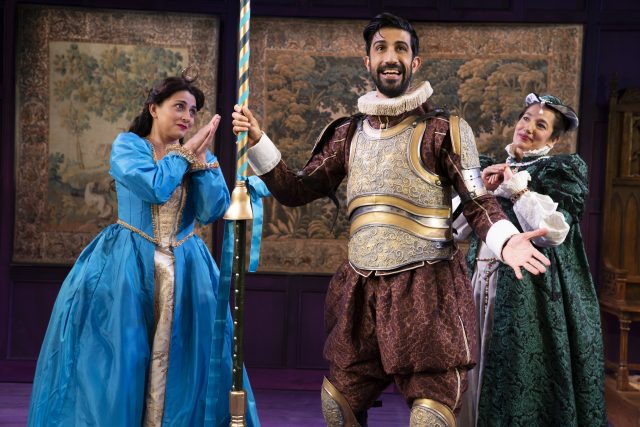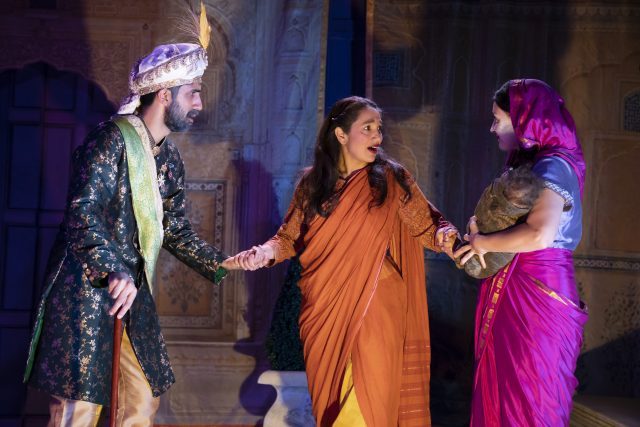
Diane de Poitiers (Aadya Bedi) and archrival Queen Catherine de’ Medici (Purva Bedi) fight over the affections of King Henri II (Sathya Sridharan) in Wives (photo by Joan Marcus)
Playwrights Horizons
Peter Jay Sharp Theater
416 West 42nd St. between Ninth & Tenth Aves.
Tuesday – Sunday through October 6, $49-$89
www.playwrightshorizons.org
Jaclyn Backhaus follows up her widely acclaimed Men on Boats and India Pale Ale, which earned her the Horton Foote Prize for Most Promising New American Play, with the world premiere of Wives, a disjointed, disappointing look at the women behind powerful men. The eighty-minute production, which opened Monday night at Playwrights Horizons, consists of four disparate scenes; the first three focus on the wives, ex-wives, and lovers of historical figures either near death or dead. In mid-sixteenth-century France, Queen Catherine de’ Medici (Purva Bedi), the wife of King Henri II (Sathya Sridharan), fights with his lover, Diane de Poitiers (Aadya Bedi), as he prepares for a jousting tournament, and the cook (Adina Verson) shares her secret for chopping onions. “Go to the larder and reach into a sack for a pair of yellow onions,” she says as if on a cooking show. “Find the ones that are not soggy because a soggy onion is a rotten onion and in sixteenth-century France a rotten onion will kill you.”
Four hundred years later, the recently deceased Ernest Hemingway (Sridharan) reads his own eulogy in Idaho, then his current and former spouses, Hadley Richardson (Purva Bedi), Martha Gellhorn (Aadya Bedi), and Mary Welsh (Verson), discuss various aspects of Big Ern’s life. “Don’t you just wonder like sometimes like how chewy and hot it would be to like be married to like such a thick slab of masculinity?” Martha says. “Just to like be tethered to a monolith that happens to be like the pinnacle of all manhood? But also, like, to own him? Like to be married is to be like property of someone but also like to own them is like the technical term. Sometimes I just totally fucking wondered what it would be for him to be mine. Well, he was mine for a time. It sucked.”
The action then shifts back to early-nineteenth-century Rajasthan, India, where hyper-moralistic British colonialist Aloysious Patterson (Verson) is spying on Maharajadhiraja Sawai Madho Singh II (Sridharan) to document his immorality with “his fave concubine, the noted witch Roop Rai” (Purva Bedi), despite being married to the Maharani (Aadya Bedi), who understands her husband’s needs and has no problem with his culturally acceptable visits to the zenana to seek additional sex partners. The Maharaja is ill and knows he is no longer in control. “Who are you dedicated to?” Roop Rai asks. “You,” the Maharaja answers. “Who do you serve?” she asks. “You,” he responds. “AGAIN!!” “YOU. YOU!!! You!!!”

Maharajadhiraja Sawai Madho Singh II (Sridharan) seeks healing from Roop Rai (Purva Bedi) and his wife, the Maharani (Aadya Bedi), in world premiere at Playwrights Horizons (photo by Joan Marcus)
The first three acts don’t flow together smoothly but have smart, funny moments in this often slapstick battle of the sexes, but it all falls apart in a frustrating and tame finale. In my otherwise favorable review of India Pale Ale, I wrote, “The play is dragged down by late pedantic speeches by Deepa and Sunny that are wholly unnecessary, merely explaining what we’ve already seen.” I can say the same thing about Wives, which moves to the present, where Oxbridge junior Swarn (Aadya Bedi) arrives at a meeting of a commune of witches led by sophomore Clarisse (Verson) and overseen by a portrait of Virginia Woolf. When asked what she hopes to accomplish, Swarn says, “I want to untether myself from the visions made by men.” It’s an admirable desire that quickly devolves into dogmatic pretension. “We’re here to help you learn who you’ve been in order to help you see who you’ll be,” a character tells Swarn, seeking to empower her in clichéd and didactic ways.
Reid Thompson’s previous playful sets and Valérie Thérèse Bart’s adorable costumes now get serious and Margot Bordelon’s (Something Clean, Eddie and Dave) appropriately loosey-goosey direction becomes heavy-handed and unctuous as Backhaus is determined to make her point by driving it home over and over again. Wives began life as three separate plays, and the ending makes you feel that, anchored by a forced conclusion that preaches at an audience that the cast and crew have already won over.